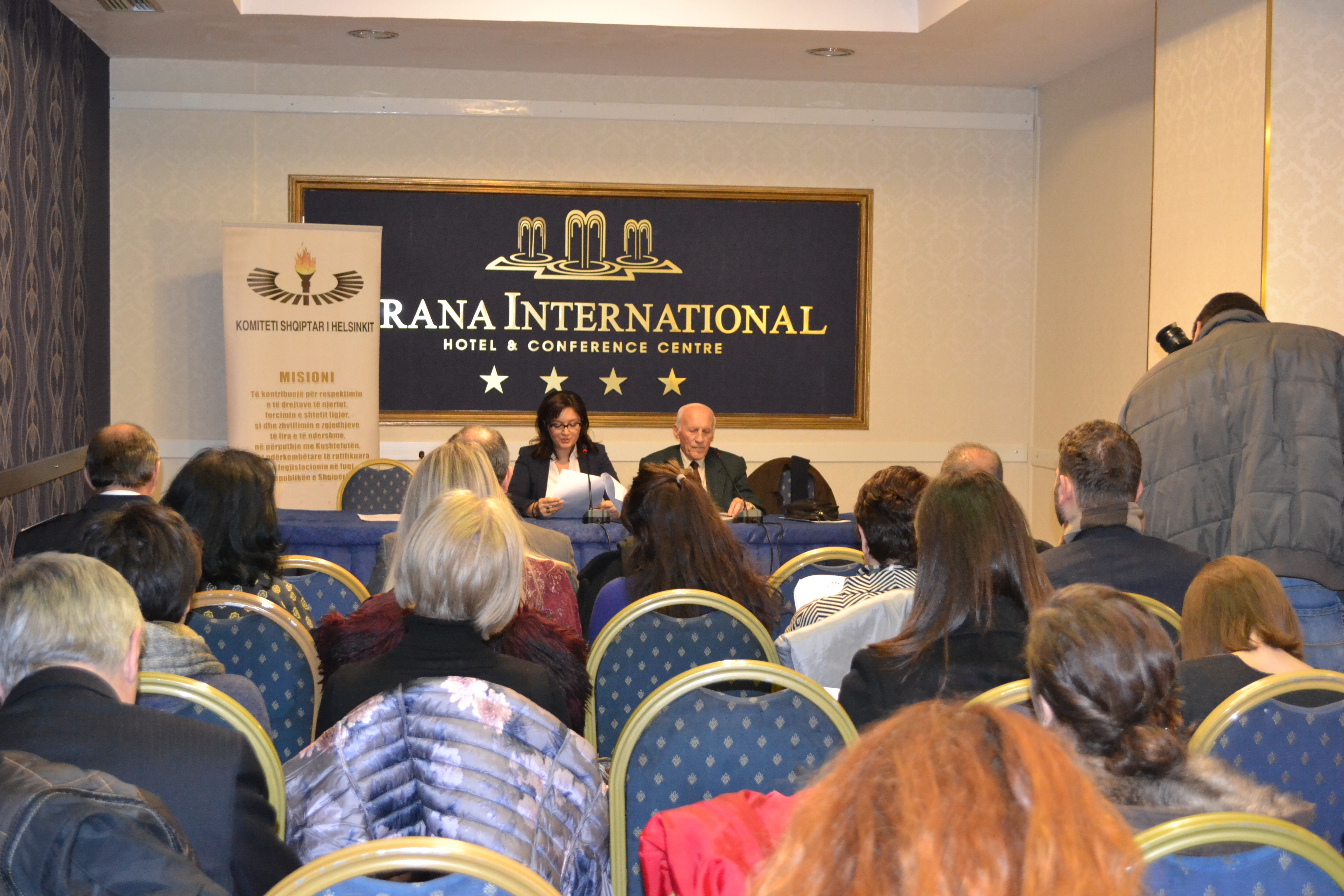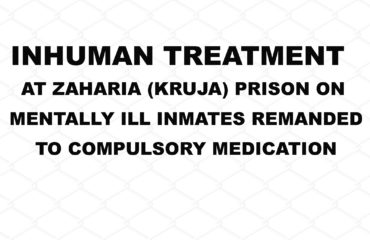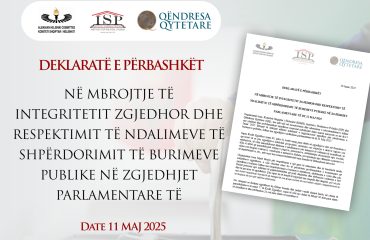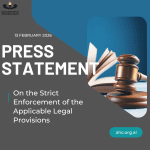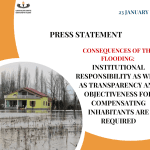On respect for human rights and freedoms in Albania during 2016
The Albanian Helsinki Committee (AHC) is preparing the annual report with regard to the situation of respect for human rights and freedoms in our country during 2016. Based on an annual tradition, we decided to inform you in this press conference in a concise manner about some of the main findings and issues of this report, which are based mainly on issues that have been the subject of verification, observation and monitoring by AHC and that are of public interest.
1. During 2016, AHC reacted publicly in 45 cases, namely 17 times based on information obtained from the media, in 7 cases based on citizens’ complaints and in 21 other cases based on monitoring conducted by the organization. Reactions considered mainly conditions and the treatment of persons deprived of their liberty in the penitentiary system, cases of security violations in prisons, cases of violence toward women and children, the need and importance for citizens of reforming the justice system and electoral reform, reactions on the protection of investigative journalism and respect for freedom of the press, on avoiding hate speech in parliamentary sessions, criminality, etc.
2. AHC has demonstrated special attention to the treatment, verification and resolution of citizens’ complaints. During 2016, we addressed over 280 complaints. Namely, 50% of these cases is still dominated by complaints by persons deprived of their liberty in prisons and pre-trial detention facilities, inappropriate conditions and the violation of the rights of these citizens by the prison administration, failure to provide health care services, claims of use of violence, etc. Meanwhile, 15% of complaints have to do with the judicial system, unjust judicial decisions, corruption of judges and prosecutors, violations of due legal process, unjust and arbitrary actions by the prosecutor’s office, etc. Complaints for advocacy services and property conflicts, particularly claims for disproportionate compensations in the process of expropriations have seen an increase, about 17% of the total.
3. In some cases, AHC has represented citizens in domestic and international courts. During the period May – July 2016, AHC addressed the European Court of Human Rights (ECtHR) with 4 complaints with regard to respect for the right of citizens for access to justice, the right to the conduct of a legal process within a reasonable period, the right to the prevention of torture, inhuman or humiliating treatment, prohibition of discrimination, etc.
Accommodation in the prison system of a group of persons consisting of about 175 mentally ill persons, remanded to a medical measure of “Compulsory medication in a medical institution, represents a severe violation of their rights and has led to the aggravation of their mental health. One of the cases that we are representing in the Strasbourg Court seeks the resolution of this endemic problem that the Albanian state has not been able to provide an effective resolution for in a period of about 20 years through their accommodation in a specialized medical institution. One request of AHC to the ECtHR has had a positive impact in that the court accepted the immediate temporary measure for a citizen deprived of his liberty who has not been offered for years a medical surgery that requires specific equipment and materials, which the state does not possess.
4. The right to life is a fundamental right and the state has the obligation to protect it. Complaints in the media as well as those directed at AHC highlight that citizens face cases of careless medication, harm to health and loss of life in traffic accidents, which in some cases are caused due to the lack of inappropriate road signage and infrastructure. They also face crimes against life, trafficking in human beings, whereby Albania is one of the 5 non-EU countries with the highest number of trafficking victims. There are also complaints about structural problems that continue to affect the public health system, such as lack of medicaments or of medical infrastructure. We would like to point out here some complaints that have been or are being addressed by AHC, such as the case of an 11-year old child diagnosed with a malign tumor, whose father secured part of the medication with his personal income because the state failed to fully secure it; the cure was excessively expensive in view of the difficult financial situation of the family. Another complaint being addressed is the lack of hearing aids for minors who have hearing impairments. Reactions by AHC and Together for Life for the lack of the medicament L- Asparaginase for children with leukemia, contributed to the positive reaction of the Ministry of Health to secure this medicament.
5. The prohibition of discrimination and the integration of marginalized society groups have been under a special focus of AHC. We conducted field monitoring over respect for the right to life, provision of health services, education, housing and employment for the Roma and Egyptian communities in the municipalities of Tirana, Durrës, Fier, Berat, Shkodra and Kruja. These monitoring missions showed that these citizens do not possess even the minimal information about their rights or the tools to request them. In spite of vaccination campaigns by Regional Health Care Directories, part of the Roma children are yet to be vaccinated. Also, part of them does not attend compulsory education or abandon it. A considerable number of persons work as individual collectors of urban waste because public policies for providing vocational courses and oriented toward the labor market have not been effective with regard to these communities. This situation places these communities in conditions under the subsistence level, which is yet to be established through legal and sub-legal acts by the state. In the areas that they live in, there are no sewage or drinkable water systems, while the majority of their homes/barracks have very poor living conditions that do not enable dignified living, but rather in some cases, is living in inhuman conditions. For the LGBTI community, an action plan has been approved for the period 2016 – 2020. However, public awareness about and the acceptance of this community in the society remains in low levels, including the presence of discriminating behavior by public employees.
6. AHC has also monitored Police Commissariats, Prisons and pre-trial Detention Facilities. Overcrowding in prisons and particularly in pre-trial detention facilities is disturbing, while the security measure of arrest in prison is enforced on defendants in considerable numbers. International standards require that this measure is implemented as a last or extraordinary resort. Alternative sentences are implemented in relatively scarce cases by the courts. The conditions of rooms where persons deprived of their liberty are held in Penitentiary Institutions in Saranda, Lushnja, Rrogozhina, Fushë-Kruja, and Fier do not enable full respect for human dignity, as a result of overcrowding, lack of beds, proper sleeping sets, hygiene tools, etc. The conduct of a broader range of educating and rehabilitating activities, guaranteeing quality health services, with regard to health care infrastructure, personnel and medicaments, continue to remain some of the challenges of the penitentiary system. The conditions in the special Institution in Zaharia, Kruja, is in such conditions that there is still violation of the rights of convicts with different acute health problems, including those who are mentally ill. AHC recommends the closing down of this institution and the
treatment and the provision of health care services.
7. AHC monitored some judicial hearings on corruption. The defendants accused of passive corruption in the public sector in almost all cases are from the low or middle levels. Impunity of high-level officials continues to remain a concern for our country. AHC applauds the positive turn that independent institutions that conduct controls and audits have taken in this regard by using the right to appeal on decisions of the prosecutor’s office to drop criminal cases, in those instances when these institutions were the ones that filed the criminal charges in the first place. We also note that our recommendations to the High State Audit and the High Inspectorate for the Declaration and Audit of Assets have become part of resolutions by the Assembly for the annual activity of these institutions. This positive turn will help rigorous enforcement of the law, higher quality investigations, and increased control over the courts and decisions of the prosecutor’s office.
8. According to date from the Ministry of Social Welfare and youth, for the period January- September 2016, a total of 3195 cases of domestic violence have been reported, marking an increase compared to 2015. Based on our monitoring during this year of 97 hearing sessions on criminal and civil cases related to domestic violence, it resulted that: 70% of the victims are female and are violated for reasons related to divorce, use of alcohol by violators, poverty and unemployment. 37% of the cases on the issuance of protection orders have been dropped because of failure of the suing party to appear in court in the first hearing; these are mainly women and the reported reason is that the conflict does not exist anymore. In 40% of the cases, the violator had 8-9 year education. Violators are for the most part reoffenders in terms of use of domestic violence.
9. AHC continues to sensitize groups of interest and monitor the enforcement of an important law that envisages the obligation of public bodies to notify and publicly consult draft acts, draft strategies and different policies of public interest. Based on monitoring conducted in 20 central institutions (19 ministries and the Council of Ministers), it results that the consultation of draft acts is not conducted in accordance with procedures and deadlines and, in some cases, is of a formal character. In parallel, AHC is undertaking the initiative to sensitize citizens about the benefits from justice reform, whereby it results that citizens want the reform and expect positive changes and turns within as short a time as possible.
10. During 2016, AHC has given its contribution to improve legislation with regard to respect for and the sanctioning of standards of human rights and freedoms. In this regard, we have given our contribution on the 7 material draft laws of the Justice System and 4 other draft laws reviewed in different standing committees of the parliament. We have also provided our feedback also about the manner of annual reporting in the parliament of constitutional or legal institutions, such as the People’s Advocate and the HIDAACI. Based on the monitoring of the Assembly website on the process of public consultation, it results that the Assembly’s Civil Society Coordinator creates the ability for the participation of the public in attending hearing sessions of standing committees of the parliament. The analysis of minutes of meetings of the parliamentary committees published on the official website of the Assembly for 2016 highlights that no groups of interest were identified or invited for consultation for 74% of the draft laws reviewed in these committees.
11. AHC has followed also the preparation for the 2017 elections, through institutional interventions addressed to the Ad Hoc Parliamentary Committee on Electoral Reform or through press statements. In April of this year, we submitted to the Parliamentary Committee 32 proposals
the activity of this Committee in order to ensure the smooth conduct of the coming elections might harm the consultation and inclusivity that this committee should ensure for amendments to the Electoral Code.1
12. For 2016 too, we have evaluated and made use of information provided through the media, which has been useful for further verifications and, on a case by case basis, for public reactions. There are some data, although unverified, that indicate that there are still journalists who work in conditions of informality, whose salaries are not paid regularly and who do not benefit social and health insurance payments. The Albanian Helsinki Committee, the ProLGBT association and Civil Rights Defenders have also called for respect for freedom of the press and the prohibition of censorship and self-censorship. The complaint by a reporter dismissed from work in a private television station, due to an investigation on the circumstances of the death of a juvenile in the Sharra Landfill, as well as the censoring of the broadcast of this video led to our reaction that investigative journalism needs more protection and encouragement and that serious journalism may not exist without sources of information.



